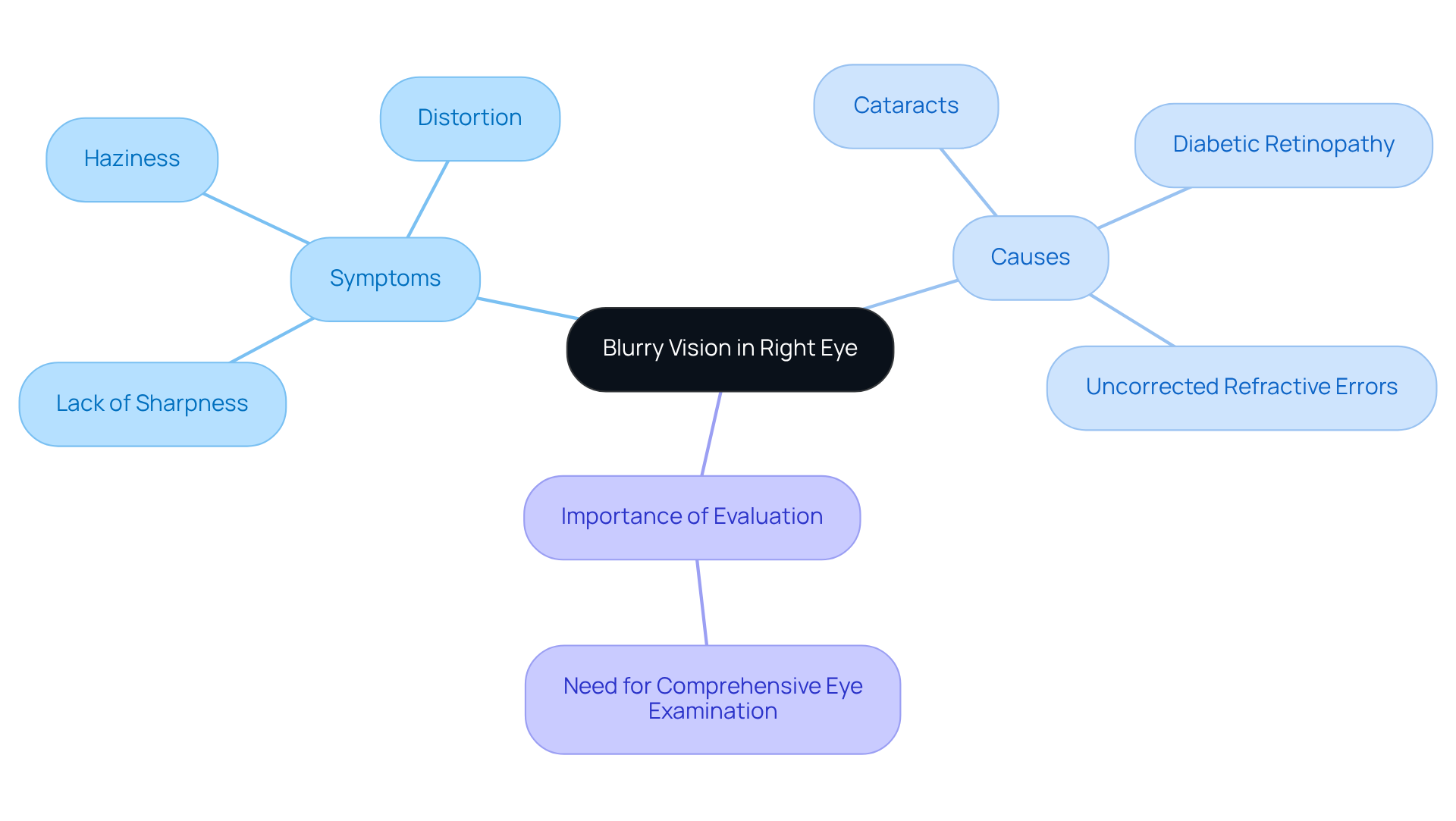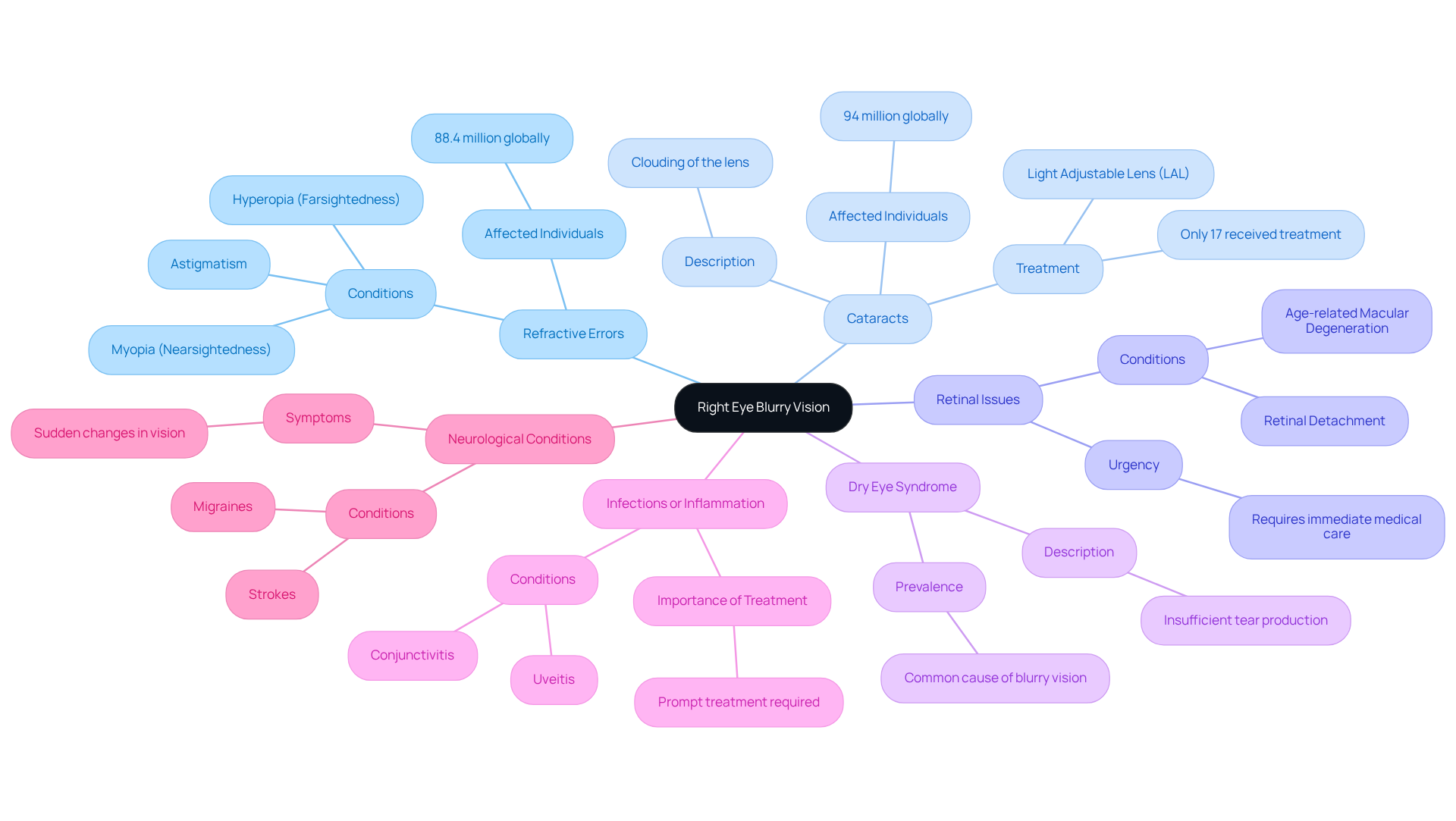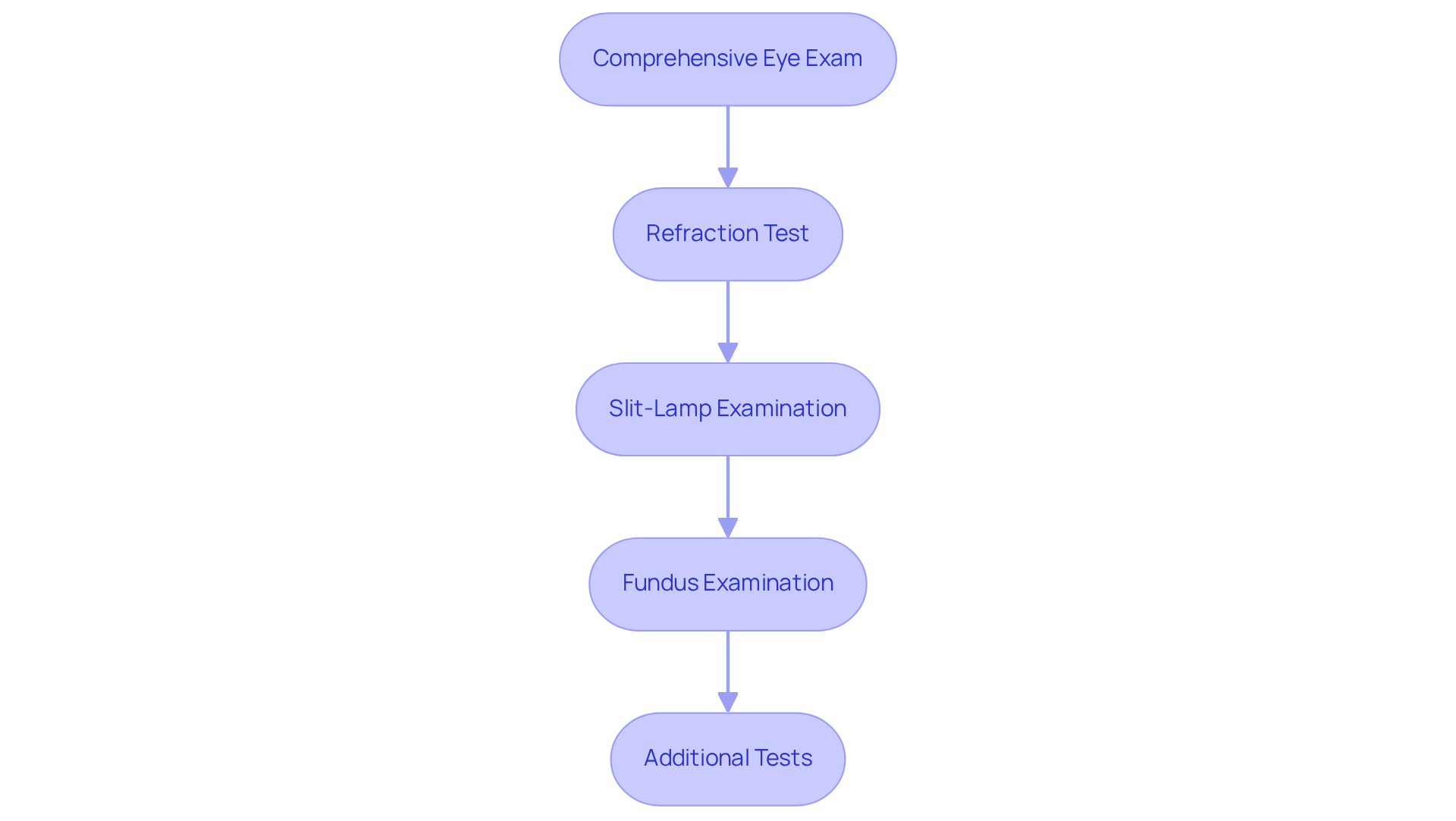Posted by: Northwest Eye in General on November 14, 2025
Introduction
Experiencing blurry vision in your right eye can feel more than just annoying; it often signals underlying health issues that deserve your attention. We understand that this can be concerning. This article explores various causes, from refractive errors to more serious conditions like cataracts and retinal problems. Our goal is to provide you with essential insights into your symptoms and potential treatments.
But what happens when the clarity of one eye is compromised? It’s common to feel anxious about the implications of blurry vision. Understanding these implications not only raises questions about your eye health but also highlights the importance of seeking timely medical evaluation. After all, safeguarding your vision is crucial, and we are here to help you through this process.
Define Blurry Vision in the Right Eye
Experiencing right eye blurry sight can be concerning. It often feels like a lack of sharpness or clarity, making it difficult to see fine details. You might notice a sense of haziness or distortion, which can be frustrating and worrisome.
We understand that this situation can affect one eye or both, and it can be either temporary or chronic. It’s common to feel anxious about unclear vision, especially when experiencing right eye blurry, as it can be a symptom of various underlying conditions, such as:
- cataracts
- diabetic retinopathy
- uncorrected refractive errors
That’s why it’s so important to seek a thorough evaluation from an eye care professional. At Northwest Eye, we encourage you to schedule an appointment for a comprehensive eye examination. Understanding your symptoms and seeking timely treatment is crucial for maintaining your eye health. Remember, we are here to help you through this process.

Explore Causes of Right Eye Blurry Vision
Right eye blurry vision can occur due to various factors, each affecting visual clarity in distinct ways. We understand that experiencing changes in your vision can be concerning, and it’s important to know what might be causing it.
-
Refractive Errors: Conditions such as myopia (nearsightedness), hyperopia (farsightedness), and astigmatism disrupt the proper focusing of light on the retina, resulting in blurred images. These errors are widespread, with about 88.4 million individuals worldwide experiencing distance sight impairment due to refractive issues. If you find yourself struggling to see clearly because of a right eye blurry, know that you’re not alone.
-
Cataracts: The clouding of the eye’s lens, often associated with aging, leads to a gradual decline in clarity of sight. Cataracts are a leading cause of eyesight impairment, affecting around 94 million individuals globally. Despite the availability of effective surgical interventions, including the innovative Light Adjustable Lens (LAL) technology at Northwest Eye, only 17% of those with cataract-related sight impairment have received appropriate treatment. The LAL provides a distinct benefit by permitting post-surgical modifications to sight, enabling a customized approach that improves the chances of attaining life without glasses. This technology employs a unique material that reacts to UV light, allowing your doctor to tailor your sight based on your lifestyle requirements. We want you to feel confident in your options.
-
Retinal Issues: Retinal issues, such as retinal detachment or age-related macular degeneration, can cause the right eye blurry vision either suddenly or progressively. Swift deterioration of sight is frequently associated with these severe ailments, requiring urgent medical care. It’s common to feel anxious about these possibilities, but seeking help promptly can make a significant difference.
-
Dry Eye Syndrome: Insufficient tear production can lead to discomfort and visual disturbances, including blurriness. This condition is one of the most prevalent reasons for right eye blurry vision and can significantly affect daily activities. If you’re experiencing dryness or discomfort, remember that there are solutions available.
-
Infections or Inflammation: Eye infections, such as conjunctivitis or uveitis, can compromise clarity of sight and require prompt treatment to prevent further complications. We understand that dealing with infections can be frustrating, but timely care is essential.
-
Neurological Conditions: Blurry sight can also be a symptom of neurological issues, such as strokes or migraines, which may manifest suddenly and require urgent care. If you notice sudden changes, it’s crucial to seek assistance right away.
Understanding these causes is crucial for timely diagnosis and treatment. Routine eye check-ups are vital for identifying these issues early, as many instances of sight impairment can be avoided or successfully handled. As Dr. Usiwoma Abugo highlights, “Whenever a patient notices a sudden alteration in their sight – discomfort in the eye, inflammation, new flashing lights or new floaters – they should promptly seek assistance from their ophthalmologist, as these may be signs of issues that could be permanently harmful to their eyesight.” We are here to help you through this process.

Understand Diagnostic Approaches for Blurry Vision
Experiencing right eye blurry vision can be concerning, and we understand how unsettling that can feel. Diagnosing the cause typically involves several important steps:
-
Comprehensive Eye Exam: An eye care professional will conduct a thorough examination, including visual acuity tests to assess how well you see at various distances. This is essential, as unclear sight can arise from issues like nearsightedness, farsightedness, or astigmatism, which may be improved with corrective lenses.
-
Refraction Test: This assessment establishes the precise prescription required for corrective lenses, helping to identify any refractive errors that may be contributing to your blurred sight.
-
Slit-Lamp Examination: This allows the doctor to examine the structures of your eye in detail, including the cornea, lens, and retina. Conditions like cataracts or macular degeneration can be identified through this examination.
-
Fundus Examination: Using an ophthalmoscope, the doctor can view the back of your eye to check for retinal issues, which may indicate diseases such as diabetic retinopathy or macular degeneration.
-
Additional Tests: Depending on initial findings, further tests such as imaging or blood tests may be necessary to rule out systemic conditions. If you notice symptoms like halos or glare, it’s important to seek professional medical help, as these can indicate deeper problems.
We are here to help you through this process, ensuring you receive the care and support you need.

Review Treatment Options for Right Eye Blurry Vision
Treatment for blurry vision in the right eye is tailored to the underlying cause, ensuring effective management and improved outcomes:
-
Corrective Lenses: We understand that dealing with blurry vision can be frustrating. Eyeglasses and contact lenses are highly effective in correcting refractive errors, such as myopia, hyperopia, and astigmatism. Eye care specialists emphasize that these lenses can significantly enhance clarity and comfort, enabling you to engage in daily activities without visual hindrance. According to Dr. Roberts, a leading eye care specialist, “Corrective lenses can transform a patient’s daily experience, providing clarity that enhances their quality of life.”
-
Medications: If you’re experiencing dry eye syndrome, the use of artificial tears or prescription eye drops can provide relief. These treatments help replenish moisture and comfort, addressing symptoms that contribute to right eye blurry vision. However, it’s common to feel some temporary irritation or dryness with many eye drop formulations, so it’s important to be aware of potential side effects.
-
Surgery: For more severe cases, surgical interventions may be necessary. Cataract surgery, which involves substituting the opaque lens with a synthetic one, boasts a success rate surpassing 95%. This makes it one of the most efficient procedures for restoring sight. At Northwest Eye, you can choose from specialized packages designed to meet your needs, such as the Single Distance Astigmatism Package, which effectively corrects nearsightedness or farsightedness. Furthermore, the innovative Light Adjustable Lens (LAL) Package allows for personalized correction following surgery, enabling you to adjust your prescription for optimal clarity. As highlighted in recent research, “Cataract surgery not only restores sight but also improves overall quality of life for patients.”
-
Lifestyle Changes: Adopting a healthy lifestyle can also alleviate symptoms. A well-rounded diet rich in antioxidants, staying properly hydrated, and regulating screen usage are essential for preserving eye wellness and reducing the likelihood of issues that lead to right eye blurry vision. Implementing the 20-20-20 rule-taking a break every 20 minutes to look at something 20 feet away for 20 seconds-can also help reduce digital eye strain.
-
Regular Monitoring: For chronic conditions, ongoing follow-up with an eye care professional is essential. Regular check-ups allow for timely adjustments to treatment plans, ensuring optimal vision health over time. Dr. Roberts emphasizes, “Regular eye exams are vital for detecting changes early and ensuring that treatment remains effective.”
Real-world examples illustrate the effectiveness of these treatments. Many individuals report notable enhancements in their quality of life after receiving corrective lenses or undergoing cataract surgery, highlighting the transformative impact of these interventions on daily activities and overall well-being. For instance, a recent case study showed that a patient who underwent cataract surgery at Northwest Eye experienced a dramatic improvement in their ability to read and drive, significantly enhancing their independence.

Conclusion
Experiencing blurry vision in your right eye can be distressing, and it’s completely understandable to feel concerned. This symptom can signal various underlying conditions, making it essential to prioritize your eye health and seek timely intervention. Whether it’s due to refractive errors, cataracts, retinal issues, or other factors, recognizing the importance of professional help is crucial.
In this article, we explore the multifaceted nature of right eye blurry vision. We outline potential causes and emphasize the necessity of thorough diagnostic approaches. From refractive errors to neurological conditions, each cause deserves attention and appropriate treatment. We also highlight available treatment options, including:
- Corrective lenses
- Medications
- Surgical interventions tailored to your individual needs
These options can significantly enhance your quality of life.
Ultimately, awareness and proactive measures are key in addressing blurry vision. Regular eye examinations, prompt consultations with eye care professionals, and informed lifestyle choices can help mitigate risks and enhance visual clarity. We understand that taking these steps can feel overwhelming, but by prioritizing your eye health and understanding the implications of blurry vision, you can take charge of your well-being. Together, let’s ensure you have a clearer, more vibrant view of the world.
Frequently Asked Questions
What does blurry vision in the right eye feel like?
Blurry vision in the right eye often feels like a lack of sharpness or clarity, making it difficult to see fine details. It may present as a sense of haziness or distortion.
Can blurry vision affect one eye or both?
Yes, blurry vision can affect either one eye or both eyes.
Is blurry vision in the right eye always temporary?
No, blurry vision can be either temporary or chronic.
What are some potential underlying conditions that can cause blurry vision in the right eye?
Potential underlying conditions include cataracts, diabetic retinopathy, and uncorrected refractive errors.
What should I do if I experience blurry vision in my right eye?
It is important to seek a thorough evaluation from an eye care professional. Scheduling a comprehensive eye examination is recommended to understand your symptoms and receive timely treatment.






